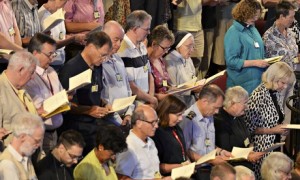This is the sermon I preached at my wife’s funeral. Many people have asked to see a copy and so I publish it here in full.
The first reading was Psalm 139:1-18
The gospel reading was a dramatised version of Mark 5:21-43 performed by Sarah’s dad, Ian Birkinshaw from his show The Gospel of Mark
Psalm 139 was an obvious choice for today for two reasons: One. It was Sarah’s favourite Bible passage bar none! Whenever she needed to teach young people about life with God she’d talk them through Psalm 139. She knew it almost off by heart (which with her memory was amazing!) I never thought to ask her, however, why it meant so much to her. The second reason that Psalm 139 was an obvious choice for today is because I always use it when I conduct funerals. It is a great funeral psalm.
When I use it for other people’s funerals I talk about how days like today are times to tell stories. We all know this person, some more intimately than others, but none of us know all the parts to the whole story. As a Christian, I say, I believe there is one person who has been there at every moment not only watching the outside life but also listening in to the inner life too. There is one who has heard every whispered hope or cried lament, each unfounded fear and every guilty pleasure. God has heard it and seen it all. I conclude by saying that the final judgement is not as medieval art would have us see it, as we cower before a detached judge; rather, the final judgement is an intimate meeting with our loving Lord as he quietly whispers into our ear our true story as he saw it. This story will be truer than even the stories we have told ourselves. For this judge knows the truth of us better than we know it ourselves. I believe we will all meet with him when we die and he will tell our stories to us. And so, I say at normal funerals, this psalm encourages us to tell the stories of this person and, as you do so, know that, by doing it, you are participating in an act of God; therefore, listen to how he would tell the story and be faithful to that telling…
But this is not a normal funeral, for me.
All of that is still important to say but today there is something more I’d like to add, and it is an attempt at answering my unasked question as to why Psalm 139 was so important to Sarah. The verse,
All the days ordained for me were written in your book before one of them came to be.
I always avoid highlighting this verse in normal funerals because there’s too much theological nuance needed to explain it but, despite her constant eye rolling at my love of theology, Sarah would be happy to hear me ‘download my brain’, as she called it, and give some ‘Ned’s notes’, So here they are…
I don’t believe that this verse means that God knows everything we’re going to do before we do it. Sarah and I agreed that God is far more collaborative than that. He has freely chosen, out of love for us, to work with our free will; our choices. So when the psalmist writes that ‘all the days ordained for me’ are written in his book I don’t think they mean it as some detailed diary entry nor can I imagine it is some magic number, like a death counter. 30 years, 12 weeks, 2 days until death! I read this passage as the psalmist reminding themself that our days are finite; they are numbered. God has put a limit on this life. Sarah, more than most of us, acknowledged and accepted that. Sarah said in an interview once,
The unexpected gift of cystic fibrosis is that we tend to live life more intentionally than those who are well, because our eye is always on the clock.
Sarah lived her life in the shadow of Death but we cannot comfort ourselves by saying that that is because she had CF. We all live in the shadow of Death; Sarah just embraced it. In the hundreds (if not thousands) of responses to Sarah’s death there are some repeated phrases or sentiments; one of them is that she was so full of life despite her illness. If you thought that, or felt it, then let me say to you what Sarah said to many in the past,
There’s nothing stopping you from doing the same.
Yes, celebrate the life she effortlessly lived but learn how to live like that too; acknowledge that your days are numbered. Before you think that this means that Sarah erred the other way and was one who believed in, ‘drink and be merry for tomorrow we die.’ You’d be wrong. Sarah was not some bucket list sort of person, she never sought to please herself because she didn’t want to have any regrets. The numbering of Sarah’s days was balanced by a deep understanding and belief in resurrection and the life eternal. This life is limited. Her life is forever.
So what of the story of Jairus’ daughter and the haemorrhaging woman? This too seemed pretty obvious: it was the set reading for the Sunday before Sarah died, it was a story so many people used to cry out for a last minute recovery and restoration of Sarah but far more significantly than all of that; it is the story Ian, Sarah’s dad, associates with his own ‘daughter’. As he performs Mark’s gospel, it is this one story that has caused him to reflect on Sarah. This story tells of a daughter who is sick and of a father who turns to Jesus and pleads for a miracle. In the story the daughter dies before Jesus gets to her. In the end, however, Jesus raises the daughter from death and restores her to her father. Cynics amongst us might say, “But Sarah didn’t get raised. She is still dead.”
The second story, of the women healed of bleeding, should not be seen as a detour or interruption to the main account of Jairus and his beloved child. This story also has something to tell us today about healing. This woman had suffered for 12 years and doctors had tried all they could to heal her. She bows before Jesus and reaches out to touch his robe; she does not speak to him, maybe she can’t bear to phrase the request… maybe she didn’t have the breath to say it but she is still healed.
A month ago I was preaching on healing at Saint Peter’s Church where Sarah and I have served together. I talked about Sarah then and said that the downward trajectory of Sarah’s health over the years often masks and hides the many miracles that God has performed along the way. In the final week of Sarah’s life we were told continually by the wonderful staff on the CF Ward,
…but Sarah always surprises us.
God has always surprised us.
Ian, Adele, Pete and I have had front row seats over the years to countless miracles, as Sarah bounces back; again and again, against the odds. People call it tenacity, strength, resilience; it is all these things but have you ever wondered where it all comes from? In the end, however, as Sarah removed her mask for the last time and chose to finish the fight; I can sense that Jesus turned towards her and was still able to say,
Go in peace and be set free from your suffering.
A healing but not in the way we would have had it.
And so to the daughter; still dead. Jesus tenderly speaks over her,
Little girl, I say to you, get up.
Sarah is not dead but asleep and Sarah was not afraid of death, she believed that when
Jesus returns he will speak over all his children,
Awake, arise. Get up.
And we will all awake together to songs of joy and great dancing. This is the hope that gave Sarah all the qualities you have been witness to for as long as you have known her.
So let me be blunt with you all. After today I do not want to hear people say to me,
I don’t know how Sarah did it.
I’ll tell you how, the one, singular, exclusive, unique, solitary reason: Jesus.
There is no other way that Sarah lived the way she did. Sarah would not give any wiggle room on that and nor will I. If you want to know the answer to that wondering: it is Jesus. Sarah has followed Jesus into death, not once but everyday; a continual surrendering into a death of this life but she bore the fruit of resurrection, day by day being transformed into the likeness of the first-fruits: Jesus.
If you have wished more people would be like Sarah, well; it starts with you. And if you want to live more like Sarah then you’re going to have to follow her in being more like Jesus. The hope, the joy, light, the life, the strength; all of it was Jesus shining through her. You have witnessed the resurrection life. That is what it was! And there is no other way to do it. There is no short cut. The journey is not as effortless as Sarah made it look: she was just well practiced. it is a tricky path to tread and many fear going down it but there is no other way to bear the fruit of resurrection, as Sarah did, than to start.
If you want to start but are afraid then I will pray for you. I will pray a prayer that Ian prayed over Sarah in her final days; a prayer that is adapted from a line of Sarah’s favourite comedian, Harry Hill’s,
That’s it, Jesus… you help.
 Who has the right to the land of Gaza and the West Bank? We could start by going into all the history and legalities over this issue. The use of words such as ownership can then be brought into question. Historical facts could then be muddied by interpretation of events and phrasings and then there’s the insurmountable obstacle of personal stories and the tangled web of historical violence from both sides.
Who has the right to the land of Gaza and the West Bank? We could start by going into all the history and legalities over this issue. The use of words such as ownership can then be brought into question. Historical facts could then be muddied by interpretation of events and phrasings and then there’s the insurmountable obstacle of personal stories and the tangled web of historical violence from both sides. Winning arguments is easy if you can just wear down your opponent and the easiest way to do that is keep moving the goal posts; re-define the terms of the argument until it gets too complicated and they get confused and worn out. You don’t need truth to do this; all you need is stamina and intelligence.
Winning arguments is easy if you can just wear down your opponent and the easiest way to do that is keep moving the goal posts; re-define the terms of the argument until it gets too complicated and they get confused and worn out. You don’t need truth to do this; all you need is stamina and intelligence. In November 2012 General Synod’s motion to vote female bishops failed, only just but enough. What was clear back then was that the debate had been established on the principle that there was an ‘us’ vs. ‘them’. The aim was not to discover wisdom but to ‘win’ at any cost. Both parties on the extremes didn’t seem to care how they would win just as long as they did. This week, however, the tone of the debate was not on winning points and persuasion but a genuine, heartfelt desire to seek wisdom and to trust one another. The debate stopped being about party politics but more about seeking genuine peace and wisdom only found in the Spirit of God.
In November 2012 General Synod’s motion to vote female bishops failed, only just but enough. What was clear back then was that the debate had been established on the principle that there was an ‘us’ vs. ‘them’. The aim was not to discover wisdom but to ‘win’ at any cost. Both parties on the extremes didn’t seem to care how they would win just as long as they did. This week, however, the tone of the debate was not on winning points and persuasion but a genuine, heartfelt desire to seek wisdom and to trust one another. The debate stopped being about party politics but more about seeking genuine peace and wisdom only found in the Spirit of God. To dismantle such a fence of division takes time, building trust and relationship something sadly lacking in our politics in this country. My very public critique of the Same Sex Marriage Bill was not based on some personal, moral judgement on homosexuality but on the way a decision was being sought. It was rushed. The lobbyists pressured opponents with the supposed lack of time and bullied people into making a response; to choose a side of the fence. Rather than taking the fences down they were happy to keep them there. People were forced off the fence onto one side or the other and it was all done by the manipulation of language. The same is being done with The Assisted Dying Bill.
To dismantle such a fence of division takes time, building trust and relationship something sadly lacking in our politics in this country. My very public critique of the Same Sex Marriage Bill was not based on some personal, moral judgement on homosexuality but on the way a decision was being sought. It was rushed. The lobbyists pressured opponents with the supposed lack of time and bullied people into making a response; to choose a side of the fence. Rather than taking the fences down they were happy to keep them there. People were forced off the fence onto one side or the other and it was all done by the manipulation of language. The same is being done with The Assisted Dying Bill.